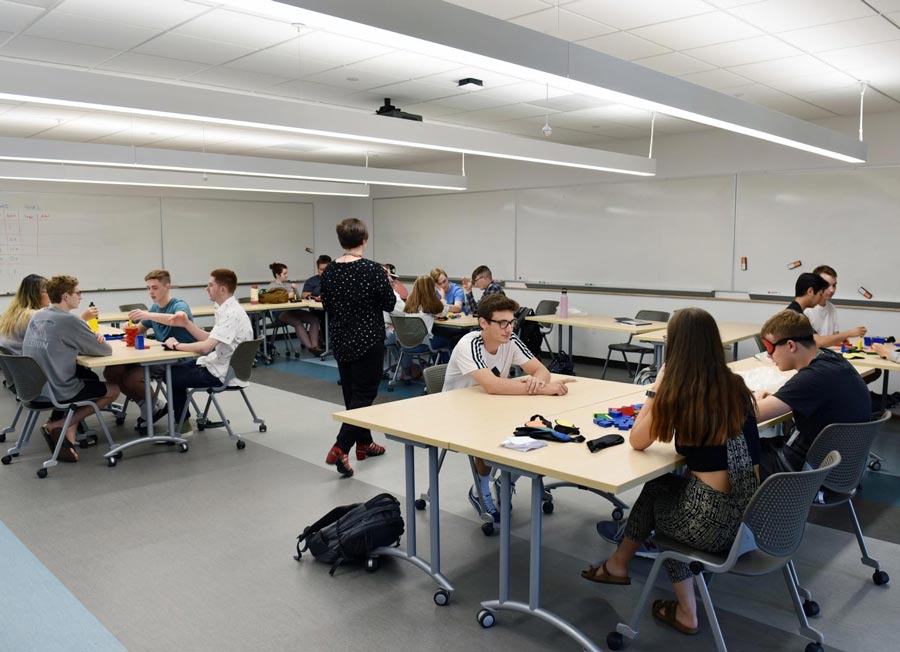This is the latest entry in our Admissions Insider series which is written by students for other students and their families.
Finding a college that is the right fit for you can be an overwhelming process. You may find yourself frantically searching Google, trying to figure out what a good college experience looks like. Before you get buried in results, stop and take a deep breath! Ask yourself, “Is a small college right for me?” This is an easy and effective place to start. Below are five reasons why a small school may be ideal for your college experience.
1. Small Class Sizes
Try to picture yourself in a college classroom. Are you sitting in a small room with 15 students or a lecture hall with more than 100 seats filled? If you prefer to interact directly with your peers and professors, a smaller college is likely right for you.
Small classes allow students to get to know their peers and professors. They offer—with their lower teacher-to-student ratios—a completely different learning environment than a typical college lecture hall. Small class sizes also allow for more discussion-based learning experiences. If you felt overwhelmed in high school when the teacher talked at you, rather than encouraged conversation, you will thrive in smaller classrooms in college.


2. Personalized Education
Another benefit of going to a small school is having a highly personalized and unique education. Smaller schools have the ability to tailor classes to their students, create extraordinary curriculums, and offer project-based rather than test-based learning. Many small colleges take an experiential approach to learning, which means you’ll learn the material you need for your major AND get to apply it right away. Experiential learning can help students who are undecided or uncertain about their major see and experience what it is really like to work in that industry.
Some institutions, like Champlain College, take more than one approach to experiential learning. Champlain works with local businesses to provide real-world projects for their students. Class speakers are often brought in to enhance students’ education and create networking opportunities. Small class sizes make this experience even better because students can discuss their questions and ideas directly with the guest speaker.
Champlain also provides students with professional, project-based opportunities in our Centers of Experience. Our on-campus experiential learning centers allow students to get paid while they collaborate with others in studio-like environments—just as they would in the real world. In the Centers, students work with experts in game development, digital forensics, cybersecurity, digital media, virtual reality, publishing, start-ups, and business management on projects for real-world clients.


3. Tight-knit Community
Another major benefit of a small college is the sense of community. One of the hardest parts of choosing a college is trying to figure out if you will feel like you belong.
Small colleges are known for their tight-knit communities and great sense of belonging. Smaller schools usually feel more friendly because students have more opportunities to get to know each other and stay connected. Getting involved with your college’s community is more important than prospective students may realize. Alumni and professors are often well-connected people who can help you find internships and jobs post-graduation. If you’re looking to create lasting friendships, be on a first-name basis with your professors, or have a strong alumni network, a small school is where you belong.


4. Leadership Opportunities
If you have ever dreamed of being president of the student body, or to lead your school’s a capella or theater group, a small school would be a great option for you. Quite simply, a small school offers far less competition and an abundance of opportunities. In addition, you may be more connected with the student body or the members of your organization because you probably know everyone involved. You may have lived in the same dorms or taken classes with a large portion of the study body, which makes you a familiar face on the ballot sheet rather than just another student.
Not only can you get involved in student government and clubs on campus, but you can also be an ambassador for your school. Champlain College encourages its small student body to participate in leadership positions such as Resident Assistants (RAs), Orientation leaders, Tour Guides, and many more.


5. Close Proximity
Imagine it’s early in the morning. You’re making your way to your 8:00 AM class. How long of a walk are you willing to take? Do you have a car? Are you comfortable taking public transportation? If you would rather not wait for the city bus or can’t imagine walking two miles to class, a smaller school is probably your best option. Small colleges are just that: small. They often have residence halls within a few minutes’ walk of their main campus and provide indoor walking options, like bridges and tunnels.


If you’re asking yourself if a small college is right for you, the best thing to do is to go visit in person! While it’s important to do your research online, it’s even more important to see the campus and everything it has to offer for yourself. Visiting campus allows you to talk to current students, walk through a residence hall, try the food, and maybe even sit in on a class. This will give you the full experience, which will help you feel more confident in your decision.